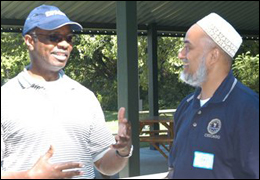|
To do its job, the FBI works with both government and private sector partners every day and at every level—local, state, federal, tribal, and international. In some cases, these partnerships directly support our investigations and operations. In other cases, they enable mutually beneficial information sharing that help us to better understand emerging threats and foster crime prevention initiatives.
Some of our most significant partnerships are listed here. You can find more partnerships and partners in the links to the right, in our National Information Sharing Strategy document, in the websites of our various divisions at FBI Headquarters, and in Partnerships webpages of each FBI field office.
Operational/Investigative Partnerships
Our national headquarters and local field offices have built investigative partnerships with just about every local, state, federal, and tribal law enforcement and intelligence agency in the nation. Our agents and support staff also work closely with international organizations like Interpol and with law enforcement and security services in foreign countries across the globe.
The following are just a few of our operational task forces and partnerships:
Public and Private Sector Information-Sharing Alliances
The FBI leads or participates in a range of government only and public/private information-sharing initiatives and partnerships, including:
- The Counterintelligence Strategic Partnerships Program builds relationships between private industry, academia, government agencies, the FBI, and its counterintelligence community partners to identify and protect projects of great importance to the U.S. government. The initiative is led by our Counterintelligence Division at FBI Headquarters, with local programs in each of our field offices. Learn more
- The Domestic Security Alliance Council (DSAC)—modeled on the U.S. Department of State’s Overseas Security Advisory Council—was created in October 2005 to strengthen information-sharing with the private sector to help prevent, detect, and investigate threats impacting American businesses. Today, DSAC enables an effective two-way flow of vetted information between the FBI and participating members, which include some of America’s most respected companies. It also gives the Bureau valuable contacts when we need assistance with our investigations. Learn more
-
Fusion Centers—usually set up by states or major urban areas and run by state or local authorities, often with the support of the FBI—“fuse” intelligence from participating agencies to create a more comprehensive threat picture, locally and nationally. They integrate new data into existing information, evaluate it to determine its worth, analyze it for links and trends, and disseminate their findings to the appropriate agency for action. Learn more
-
InfraGard brings together representatives from the private and public sectors to help protect our nation’s critical infrastructure—both virtual and physical—from attacks by terrorists and criminals. The InfraGard program is run at the national level by our Cyber Division, and each FBI field office has at least one chapter where meetings are held to discuss threats and share experiences and best practices. Feature story | Visit the InfraGard website
- The Internet Crime Complaint Center (IC3) is a partnership of the FBI and the National White Collar Crime Center that serves as a clearinghouse for triaging cyber complaints. Based in West Virginia, it works closely with a range of law enforcement agencies and private sector groups. IC3 also performs analysis and research and releases annual statistics. Learn more
- The National Cyber Forsenics & Training Alliance, located in Pittsburgh, consists of experts from industry, academia, and the FBI, who work side by side to share and analyze information on the latest and most significant cyber threats. Learn more
- The National Gang Intelligence Center integrates gang intelligence from across federal, state, and local law enforcement on the growth, migration, criminal activity, and association of gangs that pose a significant threat to the United States. Manned by analysts from multiple agencies, it supports law enforcement by sharing timely and accurate information and by providing strategic/tactical analysis of intelligence. Learn more
Community Outreach Partnerships
 |
|
| A Chicago Citizens’ Academy graduate (right) talks with Chicago Assistant Special Agent in Charge Arthur L. Everett. |
|
Our Community Relations Unit at FBI Headquarters and our community outreach specialists around the nation create and strengthen relationships locally and nationally with minority groups, religious and civic organizations, schools, non-profits, and other groups. Through these relationships, we exchange ideas and dispel misunderstandings, become more aware of our respective resources and needs, and build key contacts within our organizations and communities. These partnerships have also led to a host of crime prevention programs, enabling families to keep safe from frauds and from cyber predators; businesses to protect themselves from hackers and economic espionage; schools and workplaces to safeguard themselves from violent rampages and from illegal drugs; and all citizens to become alert to potential acts of terror and extremism.
|


